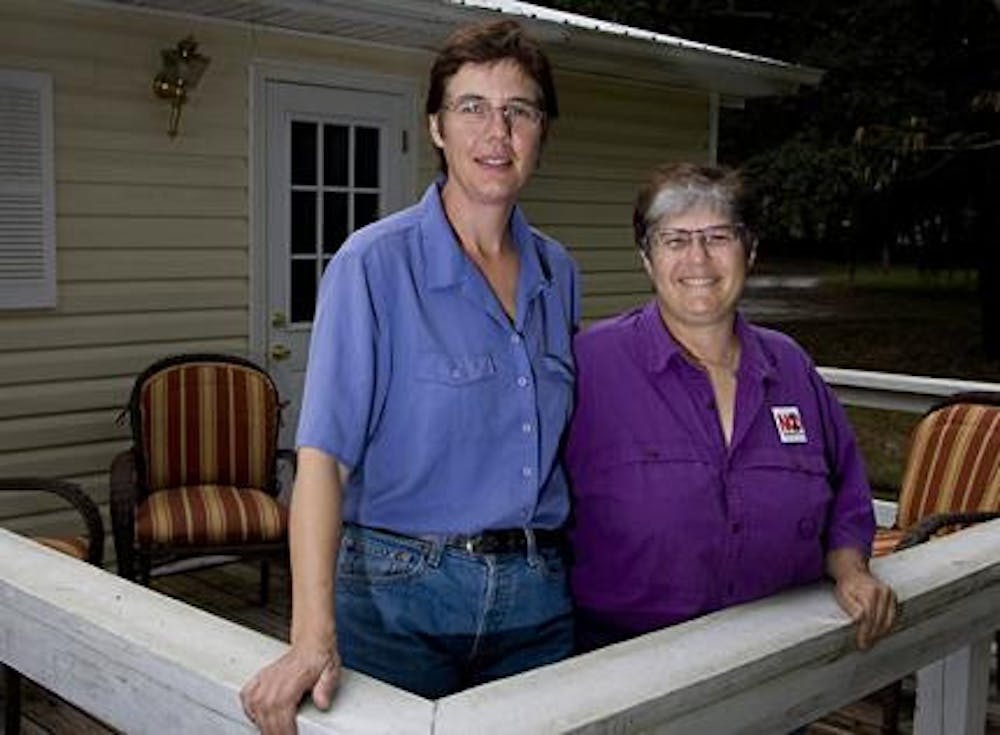Jean Zeeb and her female partner were used to having the legal equivalent of marriage in Vermont.
But once they moved to Florida, Zeeb said she felt their rights had been stripped from them.
"Suddenly, my partner and I are legal strangers to each other again," she said.
Zeeb is one of many Floridians, homosexual and heterosexual alike, who believe Amendment 2 is a direct threat to state partner benefits, such as hospital visitation, insurance sharing and Social Security benefits.
"The political conversation is about whether I'm human or not," Zeeb said.
If passed, Amendment 2 would dictate that marriage is between one man and one woman and "no other legal union that is treated as marriage or the substantial equivalent thereof shall be valid or recognized."
The amendment could become part of the Florida Constitution if 60 percent of voters approve it on Tuesday.
However, some partners living in Florida see this amendment as a threat to their benefits and rights.
Zeeb, 56, who lives near the Gainesville area with her partner, Sabine Dickel, 41, said people haven't been very welcoming of their partnership.
Zeeb said someone posted a "Vote Yes on 2" sign at the end of the street where they live.
"It felt very directed to us," Zeeb said.
Misguided on Marriage
Gainesville resident Mark Paris, who has been with his male partner for 14 years, said Amendment 2 makes him feel as if Florida citizens are saying, "We don't want you. We don't approve of you. You don't belong."
"It's painful," he said, "and it makes me angry."
Gaby Madriz, the Alachua County field organizer for the Fairness for All Families campaign, which organizes the Vote No on 2 campaign, said many people don't know about this amendment or are misinformed about its consequences.
"It's not about gay marriage," Madriz said. "Gay marriage is illegal now. It's going to be illegal the day after the election."
Florida statutes already affirm that same-sex marriage is not legally recognized in the state, and the term "marriage" only means a legal union between one man and one woman.
UF women's studies professor Florence Babb, who has been in a relationship with her female partner for 10 years, said the wording of Amendment 2 implies that marriage has always been between one man and one woman.
The amendment doesn't acknowledge the diversity of human relationships throughout history, Babb said.
"It tries to establish a narrative of the family that is inaccurate," she said.
Benefits at Risk
Because the definition of the amendment is so broad, Gainesville's domestic partnership registry could immediately be at risk because it states that no other legal union equivalent to marriage will be recognized, Madriz said.
The benefits that these partners receive, such as hospital visitation privileges, funeral arrangement rights and health insurance policies, could all be jeopardized if the amendment passes.
"It's just not right to involve a constitutional amendment to define who you're able to see in a hospital, who you're able to take care of," Madriz said.
If the state approves the amendment, domestic partnerships and unions equivalent to marriage could be invalidated.
"People would go back to square one," she said.
Madriz said cities offering domestic partnerships could be sued, which could incur high legal costs and take resources from taxpayers.
Derek Newton, the campaign manager for Florida Red and Blue, a political committee against Amendment 2, said a city like Gainesville could be "hauled into court."
He added that a court could force Gainesville into canceling their domestic partner benefits and programs.
Babb said the domestic partner registry is an indication that Gainesville is an open-minded community, but the amendment has the potential to be a serious setback.
"The town itself would be losing a bit of its progressive orientation and its humanity," she said.
Not Just Gay Couples
Amendment 2 would not only pinpoint same-sex partnerships; it could also affect men and women who choose not to get married but still want to be legally recognized.
"A lot of couples who are living together in Florida are not necessarily gay couples," Madriz said.
Besides the repercussions for homosexual couples, the amendment would also affect senior citizens and other heterosexual partners who share benefits.
For example, a senior citizen who has been widowed and receives benefits from his or her dead spouse sometimes doesn't choose to remarry.
Many people decide not to remarry because they would lose benefits if they did, Madriz said, so domestic partnership is an attractive alternative.
In addition to affecting partnerships, Amendment 2 could also leave its mark on local businesses and schools.
Gainesville City Commissioner Craig Lowe, who is gay, said Amendment 2 has the ability to hurt domestic partner benefit packages that some employers offer, including the city of Gainesville, Alachua County and UF.
He said it could also affect UF's ability to attain high-quality faculty and students.
"It would make lesbian and gay people feel unwelcome in the state of Florida," Lowe said.
UF associate English professor Kim Emery said the university is already having a difficult time recruiting and maintaining faculty because of budget cuts.
UF could have an even harder time convincing people to leave another country or state where their families are legally recognized units, Emery said.
Tom Auxter, the statewide president for United Faculty of Florida, an organization that has represented higher-education professionals since 1976, said universities and colleges that don't offer partner benefits are "irrational."
Auxter agreed that Amendment 2 could have a negative effect on partner benefits, such as health insurance packages.
The United Faculty of Florida, as well as the Florida Education Association, both voted to oppose Amendment 2.
"There is an awareness when it comes up that this amendment does nothing good at all," he said.
Judgment Day
Emery said she worries that people are focusing so much on the presidential race that other ballot issues are getting overlooked.
People would have a different mindset about Amendment 2 if it were presented as taking away benefits from partnerships and civil unions instead of being against gay marriage, she said.
"It takes health care away from people, from adults and children who need it," Emery said. "I just can't see the good in that."
Zeeb, who is politically active and has been knocking on doors for the Obama campaign, voted no on Amendment 2 on Oct. 20, the first day of early voting.
She said she sees Amendment 2 as a step in the wrong direction when it comes to the rights of Floridians.
"I should be able to love whom I want and form a legal union with the person I love," she said.






